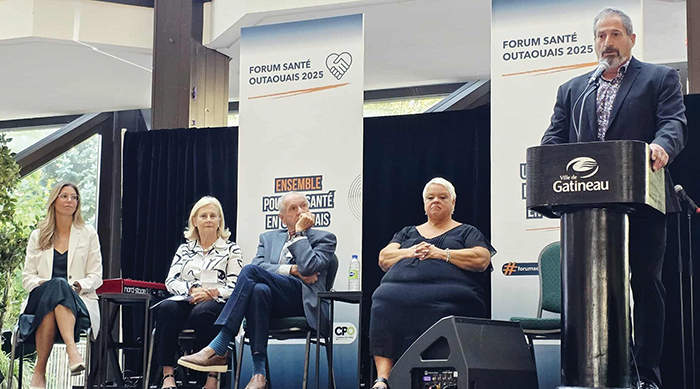Outaouais Health Forum confronts $348M gap and urges shift in power
Tashi Farmilo
Local Journalism Initiative
Published online September 24, 2025, at www.pontiacjournal.com
GATINEAU – The chronic underfunding of health and social services in the Outaouais took centre stage September 18 at a public forum at the Maison du citoyen in Gatineau. Elected officials, health workers, and local organizations gathered for the Forum Santé Outaouais 2025 to demand fair funding and greater control over how healthcare is delivered. Their message was clear: the Outaouais is being left behind.
Organized by Action Santé Outaouais, AQDR Outaouais, and the Conférence des préfets de l’Outaouais, the forum focused on one number — $348 million. That’s the estimated annual shortfall in health funding compared to other Quebec regions. Speakers linked the gap to the daily struggles residents face in accessing care.
Five regional leaders took the stage: Gatineau Mayor Maude Marquis-Bissonnette, and Wardens Chantal Lamarche (MRC Vallée-de-la-Gatineau), Marc Carrière (MRC des Collines), Jane Toller (MRC Pontiac), and Paul-André David (MRC Papineau). All pointed to a growing population, rising needs, and a lack of staff and services. They called for decisions to be made locally and for funding that reflects the region’s reality.
Education leaders Steve Brabant of Cégep de l’Outaouais and Murielle Laberge of Université du Québec en Outaouais stressed the need for long-term investment in training healthcare workers. Dr. Marc Bilodeau, CEO of the regional health authority (CISSSO), acknowledged efforts underway but admitted the shortage is dire, with more than 1,400 vacancies.
In the Pontiac, 80% of residents now cross into Ontario for care. Toller said the closure of obstetrics in the Pontiac is unacceptable, forcing women to give birth in Pembroke or Gatineau. More C-sections are scheduled to accommodate long travel times. “Women have the right to give birth where they live,” she said, pledging to fight to restore local birthing services.
Seniors’ care is another pressing issue: the region is already short nearly 400 long-term care beds, a gap expected to reach 1,400 by 2040. The Outaouais also ranks last in Quebec for publicly funded home-care hours. With too few family doctors, many seniors struggle to stay at home.
Mental health services were described as fragmented and underfunded, especially outside Gatineau. Community groups face long wait times and unstable financing, while rural areas contend with distance, transport, and language barriers.
Participants proposed local solutions: planning tables with real decision-making power, an innovation hub for recruitment and research, expanded training programs, housing incentives for staff, better recognition of foreign-trained professionals, and clear pathways from schools into health careers.
Other recommendations included restoring local decision-making to CLSCs, especially in remote and Indigenous communities; cooperative housing and guaranteed home-care hours for seniors; and, in mental health, stable funding for community groups, mobile crisis teams, and stronger links between schools, clinics, and youth services.
Photo – G/D: Mayor Maude Marquis-Bissonnette, and wardens Jane Toller, Paul-André David, Chantal Lamarche, and Marc Carrière. (TF)
